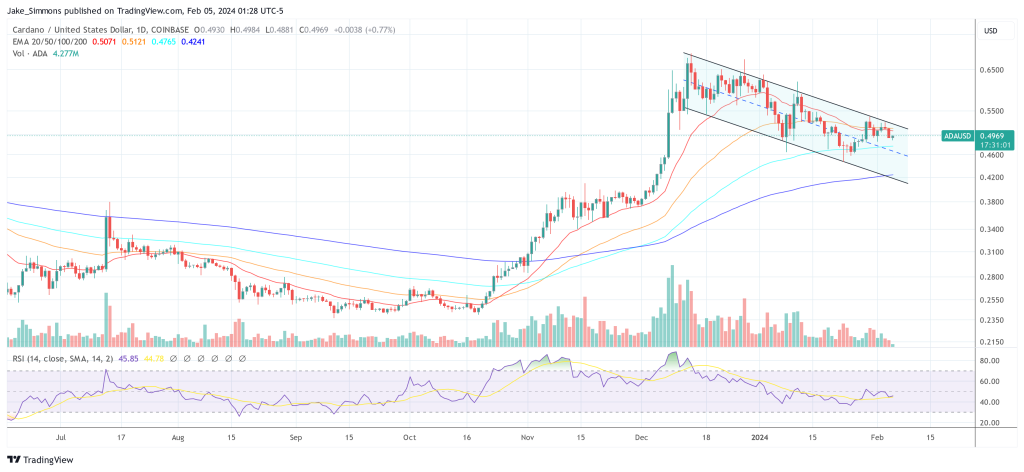In a recent exchange of ideas on X (formerly Twitter), a debate unfolded between Charles Hoskinson, the founder of Cardano, and Muneeb Ali, co-founder of Stacks, a project focused on enabling smart contracts on Bitcoin. The discussion centered around the potential and limitations of Bitcoin’s layer-2 (L2) innovations, particularly in comparison to networks like Cardano and Ethereum.
Can Bitcoin L2’s Never Be Like Cardano?
Muneeb Ali began by sharing insights from the Satoshi Round Table in Dubai, highlighting the bustling activity around Bitcoin L2 projects. He tweeted, “Quick thoughts from Satoshi Round Table in Dubai: The Bitcoin L2 session yesterday was the largest session I’ve seen here. Packed and 5 Bitcoin L2 projects there.”
He added “BitVM changes the game because you effectively get trustless BTC movement to L2s (1-of-n honest assumption). $100B Bitcoin L2 market seems conservative given the potential here of truly (and finally!) unleashing BTC the asset via programmable L2s.” Ali emphasized the rapid growth of Bitcoin L2s, predicting a significant increase in Bitcoin dominance if these projects take off.
Quick thoughts from Satoshi Round Table in Dubai:
– The Bitcoin L2 session yesterday was the largest session I’ve seen here. Packed and 5 Bitcoin L2 projects there.
– Today, multiple parallel sessions going on about Bitcoin L2s, BitVM, peg security, Bitcoin Defi etc.
– BitVM…
— muneeb.btc (@muneeb) February 4, 2024
Responding to Ali’s enthusiasm, Hoskinson presented a contrasting viewpoint, emphasizing Bitcoin’s architectural limitations. He argued, “Having been around for more than ten years, I have seen this narrative thrice. It follows the halving. Every L2 venture will learn that it’s impossible because Bitcoin cannot change enough to support the things required for a vibrant L2 environment.”
Hoskinson elaborated on the evolving nature of Ethereum and Cardano, stating, “Both Ethereum and Cardano continuously upgrade to enhance your options as a developer to deploy effective, efficient, reliable, and secure L2s.”
He further critiqued the practical aspects of implementing L2 solutions on Bitcoin. “This means EVERYTHING is insanely hard to do with Bitcoin L2s and usually requires CENTRALIZED or FEDERATED infrastructure to operate. If it’s CENTRALIZED or FEDERATED, then it’s not Bitcoin,” he stated, pointing out the fundamental contradiction with BTC’s decentralized ethos.
Hoskinson Vs. Ali
Ali countered by mentioning BitVM, a new technology that allows new functionalities at the L1 to be deployed, with further upgrades being handled at the L2 level. He asserted, “Zero changes to Bitcoin required. Read the part about BitVM. BitVM is how new things needed at L1 get deployed. Everything else runs on L2s. The L2s can upgrade as frequently as you need.”
Hoskinson, acknowledging his awareness of BitVM, remained skeptical. He elaborated on the practical limitations and security concerns associated with Bitcoin L2s, arguing that they often end up relying on federated models that contradict the decentralized ethos.
“The issue is getting value into the L2 and out, the security model, the latency of settlement, and many other functional requirements for practical DeFi. It works until it doesn’t and you need something from Bitcoin,” Hoskinson stated.
Ali defended BitVM, claiming that it resolves the critical issues of transferring BTC in and out of L2s with practical latency and a 1-of-n honest assumption. “The game has changed forever. I’ve seen the failed attempts of past years. This is different. We got the key missing piece,” he argued.
Hoskinson, however, remained unconvinced, equating the new developments to “new paint on old ideas.” He raised concerns about long finality windows and optimization trade-offs when involving fraud proofs in such systems.
“It’s the same trust assumption. MPC protocols operate off of usually 1 of n honesty. Also whenever you involve fraud proofs, you suffer from long finality windows and usually many bad optimization tradeoffs,” the Cardano founder claimed.
Remarkably, the last word does not yet seem to have been spoken. It remains to be seen whether other voices from the Bitcoin L2 community will contradict Hoskinson’s claims.
At press time, Cardano (ADA) traded at $0.4969.









